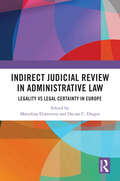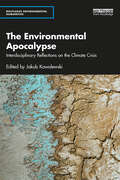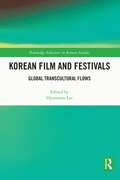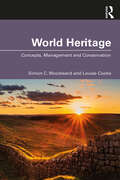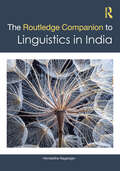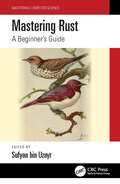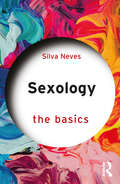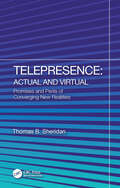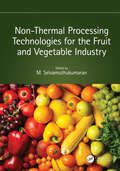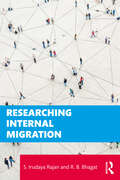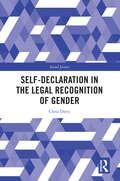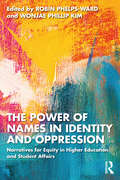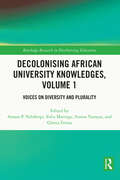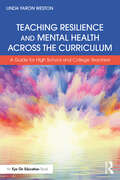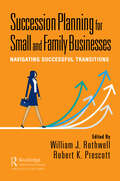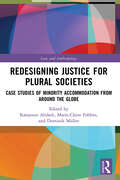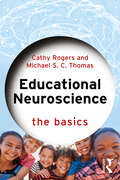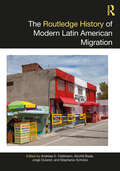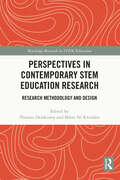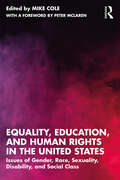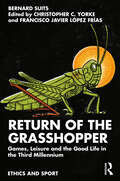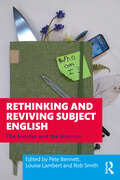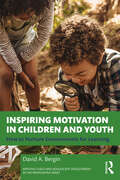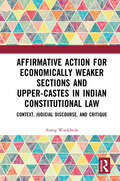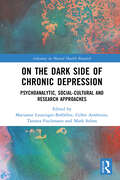Special Collections
Benetech’s Global Certified Accessible Titles
Description: Benetech’s GCA program is the first independent third-party EPUB certification to verify ebook accessibility. By creating content that is born accessible, publishers can meet the needs of all readers. Learn more: https://bornaccessible.benetech.org/
- Table View
- List View
Indirect Judicial Review in Administrative Law
by Mariolina Eliantonio and Dacian C. DragosThis book provides a comparative analysis of the concept and concrete application of the system of indirect review of administrative action. The indirect review of administrative action is a judicial review mechanism that permits re-visiting already settled administrative measures. As an indirect way of challenging the validity of a measure or act by attacking the legal basis on which it is founded, it can regard either general acts or individual acts and measures. This book explores whether the system of indirect review is a suitable remedy for modern administrative justice, assessing whether it fairly balances the legality and the legal certainty principles. It examines the tension between the two principles and seeks to establish what the standards of review are and whether a common European trend can be discerned by analysing the theory and practice from jurisdictions in Western and Eastern Europe, as well as the EU legal system. The book will be a valuable resource for academics, researchers and policy-makers working in the areas of Administrative Law, EU law, and Public Administration.
The Environmental Apocalypse
by Jakub KowalewskiThis volume brings together scholars working in diverse traditions of the humanities in order to offer a comprehensive analysis of the environmental catastrophe as the modern-day apocalypse. Drawing on philosophy, theology, history, literature, art history, psychoanalysis, as well as queer and decolonial theories, the authors included in this book expound the meaning of the climate apocalypse, reveal its presence in our everyday experiences, and examine its impact on our intellectual, imaginative, and moral practices. Importantly, the chapters show that eco-apocalypticism can inform progressively transformative discourses about climate change. In so doing, they demonstrate the fruitfulness of understanding the environmental catastrophe from within an apocalyptic framework, carving a much-needed path between two unsatisfactory approaches to the climate disaster: first, the conservative impulse to preserve the status quo responsible for today’s crisis, and second, the reckless acceptance of the destructive effects of climate change. This book will be an invaluable resource for students and scholars interested in the contributions of both apocalypticism and the humanities to contemporary ecological debates.
Korean Film and Festivals
by Hyunseon LeeThis book examines the various film festivals where Korean cinema plays a significant role, both inside and outside of Korea, focusing on their history, structure and function, and analysis of successful festival films. Using Korean film festivals and Korean cinema at international film festivals as its primary lens, this interdisciplinary volume explores the shifting relationships between the multi-media genre of film and the fast-growing changing world of film festival cultures. It examines the changing aesthetics of Korean film in a transcultural context and historical (dis)continuity from a variety of angles from film and media studies, literary and cultural studies, Korean studies, Japanese studies, and also from film festival practice. Moreover, through comprehensive examinations of both domestic and international film festivals from the perspectives of production, distribution and marketing it highlights the reception of Korean cinema outside of Korea in an increasingly globalised industry. Featuring the contributions of expert scholars of international film and Korean cinema, in addition to interview material with a practicing film professional, this book will be of huge interest to students and scholars of Korean and Asian film and media studies, as well as those interested in the impact of film festivals more generally.
World Heritage
by Simon C. Woodward and Louise CookeWorld Heritage: Concepts, Management and Conservation presents an insight into discussions and debates surrounding the UNESCO World Heritage List, and the properties on it. Since its creation 50 years ago, the World Heritage Convention has been lauded as one of the most successful international expressions of cooperation, whilst at the same time being widely criticised as producing an overly commercialised and globalised sense of heritage. Offering an in-depth discussion of both sides of the debate, this book explores these issues by discussing the following topics: • How the World Heritage Convention was conceived and how it is operationalised; • How the World Heritage concept is currently being used and misused; • The benefits of inscription – perceived and actual existential threats faced by World Heritage Site managers including climate change, urban development, overtourism, military action and natural disaster; • The future of World Heritage as an instrument for conservation and economic development. Case studies from a global range of World Heritage Sites are included throughout, to showcase some of the successes and also missuses of World Heritage status. This book will be of pivotal interest to students and scholars in the fields of tourism, heritage, archaeology, natural resource management and development studies.
The Routledge Companion to Linguistics in India
by Hemalatha NagarajanThis companion offers a unique introductory study of linguistics in India. Well supplemented with sample problems and linguistic puzzles to bolster analytical skills and logical reasoning, it promotes a unique inquiry-based approach to learning linguistics. The volume looks at all the major subdisciplines of linguistics, including phonetics, phonology, morphology, semantics, syntax, and the interdisciplinary domains of psycholinguistics and neurolinguistics. It provides a wealth of data not only from many Indian languages belonging to the primary language families present in the country – Indo-Aryan, Dravidian, Austro-Asiatic, and Tibeto-Burman – but also from the endangered languages of the Tai-Kadai family of Assam and the Greater Andamanese family. The author gives a holistic view of the linguistic landscape of India and fills a significant gap in the study of the lesser-known languages of South Asia. This volume will be an excellent resource for students and researchers of Indian languages, cultural studies, South Asian studies, and all branches of linguistics.
Mastering Rust
by Sufyan Bin UzayrMastering Rust helps the reader master the powerful Rust programming language for creating stable and versatile applications and projects. Rust is a dependable and robust programming language that was created with today’s needs in mind, which is something that several other scripting languages lack. Rust was developed to provide high functions comparable to those of C and C++, and with a focus on code integrity, which is, arguably, lacking in languages such as C. Rust is a dynamically typed language that emphasizes performance and reliability, particularly in parallelism and storage organization. Rust allows you to store data on the tower or the shedload, and it recognizes the importance of performance optimization. It permits even more effective memory usage as well as faster memory management than most other programming languages in its league. Make no mistake about it – Rust is a programming language with a strong learning curve, and is considered complicated by even the most experienced of developers. The rewards for learning Rust are aplenty, but the learning process itself requires a good deal of determination and hard work. Nonetheless, Rust aims to provide a secure, concurrent, and practical systems language in ways that other programming languages do not, and this is primarily why Rust is often the preferred choice for building complex and highly stable apps. Rust boasts of advantages over many other programming languages in terms of expressiveness, speed, sound design, and memory storage. Though the language is new and constantly changing with time, there is an excellent opportunity in this field for future employment. That said, to learn the reliable language that is Rust, you need to have an equally reliable companion guide in your hands, and this is where Mastering Rust comes in. With Mastering Rust, learning Rust programming language becomes a charm, and will undoubtedly help readers advance their careers. The Mastering Computer Science series is edited by Sufyan bin Uzayr, a writer and educator with more than a decade of experience in the computing field.
Sexology
by Silva NevesSexology: The Basics is the contemporary manual of human sexuality, eroticism, and intimate relationships. It takes you to every corner of the human erotic mind and physiological arousal response for a thorough understanding of all the functional parts of our sexualities, including how we bond, love and have sex from a broad perspective of diversities in sex, gender, and relationships, from monogamy to polyamory, Vanilla to Kink. This book bridges the gaps in our knowledge of sex education. It is the ultimate guide to answering all the questions you never dared to ask, whether you are a student or a professional, or want to make sense of our often confusing erotic world.
Telepresence
by Thomas B. SheridanTelepresence: Actual and Virtual explores the history of telepresence from the 1948 developments of master–slave manipulation, through to current telepresence technology used in space, undersea, surgery and telemedicine, operations in nuclear and other hazardous environments, policing and surveillance, agriculture, construction, mining, warehousing, education, amusement, social media, and other contexts. It also describes the various operator hand and body controls and the corresponding telerobotic actuation of robotic hands, arms, and locomotion. This book reviews the sensing and control technology, its history and likely future, and discusses the many research and policy issues that are raised. The book also takes up key questions relating to social and ethical issues, given that a person’s mechanical reach is becoming unlimited, enabling one to perform mischievous or harmful acts without identification, and what that portends for future developments in telepresence, including regulation and recommended directions of development. The primary audience for this book is professionals interested in human–robot interaction, human factors engineering, virtual reality, applications to space and undersea exploration, telemedicine and telesurgery, firefighting, mechanized agriculture, policing, drone surveillance, warehouse parts' fetching, mining, and military operations.
Non-Thermal Processing Technologies for the Fruit and Vegetable Industry
by M. SelvamuthukumaranFruits and vegetables rapidly spoil due to growth of microorganisms, which further render them unsafe for human consumption. The traditional methods of food preservation, which involves drying, canning, salting, curing, and chemical preservation, can significantly affect food quality by diminishing nutrients during heat processing. This can alter the texture of the products, leave chemical residues in the final processed products, which in turn has greater impact over consumers' safety and health concerns. To combat this problem, various current non-thermal food processing techniques can be employed in fruit and vegetable processing industries to enhance consumer satisfaction for delivering wholesome food products to the market, thus increasing demand. Non-Thermal Processing Technologies for the Fruit and Vegetable Industry introduces the various non-thermal food processing techniques especially employed for fruits and vegetables processing industries; it deals with the effect of several non-thermal processing techniques on quality aspects of processed fruits and vegetable products and keeping quality and consumer acceptability. Key Features: Describes the high-pressure processing techniques employed for processing fruit and vegetable based beverages Discusses the safety aspects of using various innovative non-thermal based technologies for the fruits and vegetables processing industries. Explains ozone application, cold plasma, ultrasound and UV irradiation for fruits and vegetables with their advantages, disadvantages, process operations, mechanism for microbes in activation etc. Presents the commercially viable and economically feasible non-thermal processing technologies for fruit and vegetable industry. This book addresses professors, scientists, food engineers, research scholars, students and industrial personnel for stability enhancement of fruit- and vegetable-based food products by using novel non-thermal food processing techniques. Readers will come to know the current and emerging trends in use of non-thermal processing techniques for its application in several fruit- and vegetable-based food processing industries.
Researching Internal Migration
by S. Irudaya Rajan and R. B. BhagatResearching Internal Migration is a comprehensive guide for researchers and professionals to study internal migration in developing and underdeveloped economies. This book: • Explains key theoretical concepts related to migration • Guides students and researchers on how to design surveys and the utility of census data • Unravels the complexities of large data sets and their interpretation • Includes techniques for indirect measurement • Presents methodology for estimating remittances at the sub-national and national levels • Acquaints the impact of migration during emergency situations or pandemics like COVID-19 • Offers perspectives and tools for evaluating the policy impact of migration Accessibly written, this book will be an essential theoretical and empirical guide for researchers in development studies, public policy, population studies, human geography and migration and diaspora studies.
Self-Declaration in the Legal Recognition of Gender
by Chris DietzSelf-Declaration in the Legal Recognition of Gender examines the impact of legislation premised upon the principle of ‘self-declaration’ of legal gender status. Existing doctrinal and comparative analyses have tended to come out strongly in favour of, or against, self-declaration. This book offers a socio-legal alternative which focuses on how self-declaration is experienced, on an embodied level, by trans and gender diverse people. It presents research conducted in Denmark, which became the first European state to adopt self-declaration in June 2014. By analysing Danish law through a Foucauldian framework which brings together socio-, feminist, and trans legal scholarship on embodiment and jurisdiction, the book offers the first empirically based and theoretically informed analysis of self-declaration. It draws upon legal consciousness, affect theory, vulnerability, and governmentality literatures to argue that the jurisdictional boundaries which existed between law and medicine were maintained throughout the reform process. This limited the impact of the legislation, enabling access to health care to be restricted in the same year in which amending legal gender status was liberalised. As the list of states that have adopted self-declaration increases, this intervention offers activists and policymakers insights which might shape how they respond to similar reform proposals in the future. A timely and important assessment, this book will appeal to researchers and practitioners working in trans, gender, feminist legal, and socio-legal studies.
The Power of Names in Identity and Oppression
by Robin Phelps-Ward and Wonjae Phillip KimStories and personal narratives are powerful tools for engaging in self-reflection and application of critical theory in higher educational contexts. This edited text centers "name stories" as a vehicle to promote readers’ understanding of social identity, oppression, and intersectionality in a variety of educational contexts from residence halls and classrooms to faculty development workshops and executive leadership board rooms. The contributors in this volume reveal how names may serve as entry points through which to foster learning and facilitate conversations about identity, power, privilege, and systems of oppression. Through an intersectional perspective, chapter authors reveal interlocking systems of oppression in education while also providing recommendations, lessons learned, reflection questions, and calls to action for those working to transform and advance equity-minded campus climates. This unique volume is for educators at colleges and universities doing equity work, seeking ways to initiate, facilitate, and maintain rich conversations about identity.
Decolonising African University Knowledges, Volume 1
by Felix Maringe and Amasa P. Ndofirepi and Simon Vurayai and Gloria ErimaThis timely work investigates the possibility of unyoking and decolonising African university knowledges from colonial relics. It claims that academics from socially, politically, and geographically underprivileged communities in the South need to have their voices heard outside of the global power structure. The book argues that African universities need a relevant curriculum that is related to the cultural and environmental experiences of diverse African learners in order to empower themselves and transform the world. It is written by African scholars and is based on theoretical and practical debates on the epistemological complexities affecting and afflicting diversity in higher education in Africa. It examines who are the primary custodians of African university knowledges, as well as how this relates to forms of exclusion affecting women, the differently abled, the rural poor, and ethnic minorities, as well as the significance of the Fourth Industrial Revolution in the future of African universities. The book takes an epistemological approach to university teaching and learning, addressing issues such as decolonization and identity, social closure and diversity disputes, and the obstacles that come with the neoliberal paradigm. The book will be necessary reading for academics, scholars, and postgraduate students in the fields of Sociology of Education, decolonising education, Inclusive Education, and Philosophy of Education, as it resonates with existing discourses.
Teaching Resilience and Mental Health Across the Curriculum
by Linda Yaron WestonWritten by a teacher for teachers, Teaching Resilience and Mental Health Across the Curriculum is an integrative approach to pedagogy for educators at the high school and college level to survive, thrive, and sustain in the profession. Blending theory, research, and practice for a comprehensive program for teachers to incorporate well-being tools into the classroom, each of the book’s five foundations includes engaging information, strategies, real-world examples, interactive reflection questions, and activities that can be directly applied to teaching and life. Practical guidance in designing real-world curriculum is offered alongside accessible strategies for engagement, investment, and active learning in student-centered classrooms. An essential guide for teachers, it includes techniques for incorporating well-being that are grounded in culturally responsive teaching, trauma-informed instruction, mental health, resilience, and emotional literacy. Teachers will also gain insight on how to make the career sustainable through practices for self-compassion and authentic self-care so they can not only survive, but flourish in and out of school. For all the challenges that students and teachers face, this book defines what it means, and what it takes, to teach in today’s classrooms.
Succession Planning for Small and Family Businesses
by William J. Rothwell and Robert K. PrescottWho will lead your organization into the future? Have you created the systems to properly implement required succession transitions? Have you put the financial tools in place to fund the transition? Do you want a plan that connects with your personal and company core values? When do you include timely planning related to strategy and talent issues? What are the appropriate communication strategies for sharing your plan? What legal issues need consideration related to the strategy, financial, and people aspects of succession? So, what is preventing you from starting this effort tomorrow? Small and family businesses are the bedrock of all businesses. More people are employed by small and family-owned businesses than by all multinational companies combined. Yet the research on small and family businesses is bleak: fewer than one-third of small business owners in the United States can afford to retire. Only 40% of small businesses have a workable disaster plan in case of the sudden death or disability of the owner, and only 42% of small businesses in the United States have a succession plan. Fewer than 11% of family-owned businesses make it to the third generation beyond the founder. Lack of succession planning is the second most common reason for small business failure. Many organizations often wonder where to start and what to do. Succession Planning for Small and Family Businesses: Navigating Successful Transitions presents a comprehensive approach to guiding such efforts. Small and family-owned businesses rarely employ first-rate, well-qualified talent in human resources. More typically, business owners must be jacks-of-all-trades and serve as their own accountants, lawyers, business consultants, marketing experts, and HR wizards. Unfortunately, that does not always work well when business owners embark on planning for retirement or business exits. To help business owners avert problems, this book advises on some of the management, tax and financial, legal, and psychological issues that should be considered when planning retirement or other exits from the business. This comprehensive approach is unique when compared to the books, articles, and other literature that currently exist on the market. This book takes on a bold and integrated approach. Relevant research combined with the rich experiences of the authors connects this thorough, evidence-based approach to action-based approaches for the reader.
Redesigning Justice for Plural Societies
by Marie-Claire Foblets and Katayoun Alidadi and Dominik MüllerThis volume examines cases of accommodation and recognition of minority practices: cultural, religious, ethnic, linguistic or otherwise, under state law. The collection presents selected situations and experiences from a variety of regions and from different legal traditions around the world in which diverse societal stakeholders and political actors have engaged in processes leading to the elaboration of creative, innovative and, to a certain extent, sustainable solutions via accommodative laws or practices. Representing multiple disciplines and methodologies and written by esteemed scholars, the work analyses the pitfalls and successes of such accommodative practices, presenting insights into how solutions could or could not be achieved. The chapters address the sustainability and transferability of such solutions in order to further the dialogue in both scholarly and policy spheres. The book will be essential reading for academics, researchers, and policy-makers in the areas of minority rights, legal anthropology, law and religion, legal philosophy, and law and migration.
Educational Neuroscience
by Michael S. Thomas and Cathy RogersEducational Neuroscience: The Basics is an engaging introduction to this emerging, interdisciplinary field. It explains how the brain works and its priorities for learning, and shows how educational neuroscience, when combined with existing knowledge of human and social psychology, and with teacher expertise, can improve outcomes for students. Cathy Rogers and Michael S. C. Thomas reveal how neuroscientific evidence is forcing us to question our assumptions about how our brains learn and what this means for education. The chapters in this vital volume step through the brain’s priorities: processing senses and moving our bodies, emotional processing, and the difficult job of dealing with other people. It unpacks the tricky tasks of thinking and learning, considering how memory works and the many systems involved in learning. It draws this all together to offer guidance for effective classroom practice, current and future. Chapter features include key issues for special educational needs and neurodiversity, case studies of novel interventions, debunking of common neuromyths, and guidance for teachers on how to evaluate their own practice. This book is a compact, lively introductory text for students of psychology, neuroscience and education and courses where these disciplines interconnect. It will also be essential reading for educational professionals, including teachers, heads, educational advisors and the many industry bodies who govern and train them, as well as anyone interested in the fascinating story of how we learn.
The Routledge History of Modern Latin American Migration
by Jorge Durand and Stephanie Schütze and Andreas E. Feldmann and Xóchitl BadaThe Routledge History of Modern Latin American Migration offers a systematic account of population movements to and from the region over the last 150 years, spanning from the massive transoceanic migration of the 1870s to contemporary intraregional and transnational movements. The volume introduces the migratory trajectories of Latin American populations as a complex web of transnational movements linking origin, transit, and receiving countries. It showcases the historical mobility dynamics of different national groups including Arab, Asian, African, European, and indigenous migration and their divergent international trajectories within existing migration systems in the Western Hemisphere, including South America, the Caribbean, and Mesoamerica. The contributors explore some of the main causes for migration, including wars, economic dislocation, social immobility, environmental degradation, repression, and violence. Multiple case studies address critical contemporary topics such as the Venezuelan exodus, Central American migrant caravans, environmental migration, indigenous and gender migration, migrant religiosity, transit and return migration, urban labor markets, internal displacement, the nexus between organized crime and forced migration, the role of social media and new communication technologies, and the effects of the COVID-19 pandemic on movement. These essays provide a comprehensive map of the historical evolution of migration in Latin America and contribute to define future challenges in migration studies in the region. This book will be of interest to scholars of Latin American and Migration Studies in the disciplines of history, sociology, political science, anthropology, and geography.
Perspectives in Contemporary STEM Education Research
by Thomas Delahunty and Máire Ní RíordáinThis book presents an overview of the methodological innovations and developments present in the field of STEM education research as well as providing a practically orientated resource on research method design more broadly. Featuring a range of international contributors in the field, the book provides a compendium of exemplary innovative methodological designs, implementations, and analyses that answer a variety of research questions relating to STEM education disciplines. Charting the thinking behind the design and implementation of successful research investigations, the book’s two parts present an accessible and pragmatically framed set of chapters that cover a range of important methodological areas presented by active researchers in the field. Ultimately, this book presents a comprehensive resource that explores the act of educational research as related to STEM. By showcasing key methodological principles with guidance on practical approaches underpinned by theory, the book offers scholarly research-informed suggestions for practice. It will be of great interest to researchers, academics, and students in the fields of STEM education and education research methods, as well as educational research more broadly.
Equality, Education, and Human Rights in the United States
by Mike ColeThis book offers an uncompromising and rigorous analysis of education and human rights by examining issues related to gender, race, sexuality, disability, and social class. Written as a companion to the very successful U.K. version, this volume reflects the economic, political, social, and cultural changes in educational and political policy and practice in the United States. Offering a comprehensive look at these areas, this book is an essential resource across a wide range of disciplines and for all those interested in education, social policy, and equality.
Return of the Grasshopper
by Bernard SuitsIn this sequel to Bernard Suits’ timeless classic philosophical work The Grasshopper: Games, Life and Utopia, published in its full and unabridged form for the first time, Suits continues to explore some of our most fundamental philosophical questions, including the value of sport and games, and their relationship to the good life. In Return of the Grasshopper, Suits puts his theoretical cards on the table, exploring the in-depth implications of his definition of utopia, assessing the merits of a gamified philosophy, and explaining how games can provide an existential balm against the fear of death. Perhaps most importantly, for the first time in print, Suits reveals his underlying worldview: that humanity is forever fated to endure a cyclical existence of privation, brought on by material scarcity, and boredom, resulting from material plenitude. An essential companion to The Grasshopper, this edition includes an introductory chapter that puts Suits’ life and work into context, helping the reader to understand why Suits has had such a profound influence on contemporary philosophy and how his ideas still provide powerful insight into the human condition. This book is important reading for anybody with an interest in the philosophy of sport, leisure and play, political philosophy, ethics, existentialism or utopian studies.
Rethinking and Reviving Subject English
by Rob Smith and Louise Lambert and Pete BennettThis book invites readers to engage with the rich and complex debates of contemporary English education, outlining new possibilities to revive the teaching of English. Bringing together diverse voices and insights from educators in English across the primary, secondary, further and higher education phases, the book offers reflections and critical engagement with the lived experiences of English teachers and pupils in contemporary educational spaces. Each chapter includes example vignettes from classrooms which tell something of the story of English teaching today. The book considers how politics and policy have worked to close the opportunities of the English classroom for self-expression and critical engagement with the world – a murder. The authors then offer an exploration of the opportunities for a re-imagining of English – the murmurs of teachers and pupils that resist such closures. The chapters explore new thinking, new practices and new possibilities for English classrooms as inclusive, emancipatory, critical and creative spaces. Offering a thoughtful and hopeful dialogue from practising English teacher-researchers, the book will be essential reading for researchers and students of English language and literature education, as well as trainee teachers of English.
Inspiring Motivation in Children and Youth
by David A. BerginInspiring Motivation in Children and Youth: How to Nurture Environments for Learning explores motivation and its crucial role in promoting well-being in the classroom and life beyond school. It will help all those who work with children and youth to understand and improve their motivation, and to create nurturing environments for younger people. David Bergin provides a highly accessible exploration of key research, examining the ways children’s goals, self-efficacy, self-determination, and feelings of being cared for affects their motivation as well as their desire to learn more about themselves and the world. This essential guide also addresses influences of competition, diversity, prejudice, and discrimination on motivation. The book provides a comprehensive look at the importance of instilling motivation at this critical age, highlighting the benefits through real-life examples and anecdotes. Illustrated with stories from diverse contexts, the author provides practical advice on how to use goals effectively, help children feel competent, autonomous, and like they belong. Inspiring Motivation in Children and Youth is for any student looking to excel in a psychological, educational, health, or social work setting, as well as professionals in the field, and parents. It is targeted for people who work or plan to work with children from pre-school to high school and will be useful to teachers, youth leaders, coaches, counselors, social workers, and nurses.
Affirmative Action for Economically Weaker Sections and Upper-Castes in Indian Constitutional Law
by Asang WankhedeThis book examines the controversial 103rd Constitutional Amendment to the Indian Constitution that introduced an income and asset ownership-based new constitutional standard for determining backwardness marking a significant shift in the government’s social and public policy. It also analyses state level policies towards backwardness recognition of upper-caste dominant groups through case studies of Maharashtra, Haryana, and Gujarat. It provides an analytical and descriptive account of the proliferation of reservation policy in India and critiques these interventions to assess their implication on constitutional jurisprudence. Further, it assesses the theoretical and empirical challenges such developments pose to the principle of substantive equality and scope of affirmative action policies in Indian constitutional law and general discrimination law theory. The monograph shows how opening up of reservations for dominant upper-caste groups and general category will have implications for the constitutional commitment to addressing deeply entrenched marginalisation emanating from the traditional social hierarchy and the understanding of substantive equality in Indian Constitutional law. Further, it highlights key contradictions, incoherence, and internal tension in the design of the reservations for Economically Weaker Sections Critical, comprehensive, and cogently argued, this book will contribute and shape ongoing constitutional policy and judicial debates. It will be of great interest to scholars and researchers of law, Indian politics, affirmative action, social policy, and public policy.
On the Dark Side of Chronic Depression
by Mark Solms and Tamara Fischmann and Marianne Leuzinger-Bohleber and Gilles AmbresinThis book brings together cutting-edge expertise from psychoanalysis, psychiatry, neuroscience and social science to shed light on the dark side of chronic depression. Considering different forms of depression on a continuum, the book develops new diagnostical considerations on depression. It includes detailed case studies from clinical psychoanalytical practice, conceptual considerations and historical analyses to current empirical and neurobiological studies on depression. The book is unique in bridging a gap between Anglo-Saxon/German psychoanalysis and French traditions in relation to clinical treatment techniques and conceptualizations of depression and trauma. Chapters present new research on the social, biographical, genetic and neurobiological determinants of severe depressive disorder and explore how these can be differentiated and expanded in the face of new cultural realities as well of new findings particularly in modern neurosciences. The book explores new understanding and discussion of treatment options for depression and will be essential reading for researchers and students in the field of depression and mental health research. It will also enrich the conceptual and clinical knowledge of psychoanalysts and psychotherapy researchers and students.
